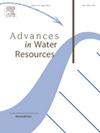Estimating horizontal velocity in shallow aquifers from temperature perturbations in observation boreholes responding to pumping
IF 4.2
2区 环境科学与生态学
Q1 WATER RESOURCES
引用次数: 0
Abstract
The practice of measuring groundwater temperature is growing rapidly and has already demonstrated to be a valuable source of information for estimating soil hydraulic parameters, groundwater–surface water exchanges, and for identifying preferential flow in both fractured and sedimentary aquifers. In the zone of seasonal thermal dynamics of unconfined sedimentary aquifers, temperature measurements in observation wells are found to exhibit a particular perturbation when the water column responds to pumping wells located in the proximity. This paper presents a description of the mechanism underlying this thermal perturbation, validating it by means of three-dimensional numerical modeling, and explores its potential as a source of information. In particular, it presents a framework enabling to estimate in-well water horizontal velocities from the time required for these temperature perturbations to reach a peak. The proposed technique is based on simple data post-processing and does not require additional experimental endeavors beyond the deployment of temperature and pressure sensors. Furthermore, through a global sensitivity analysis based on Monte Carlo numerical simulations, we show that in-well heat propagation begins to show sensitivity to the thermal properties of the well screen, the filter pack and the natural porous medium at thermal Peclet numbers lower than approximately 3.7.
从观测钻孔响应抽水的温度扰动估计浅层含水层的水平速度
测量地下水温度的做法正在迅速发展,并已证明是估计土壤水力参数、地下水-地表水交换和确定裂缝和沉积含水层优先流动的宝贵信息来源。在无约束沉积含水层的季节热动力学区,发现当水柱对附近的抽水井作出响应时,观测井的温度测量表现出特殊的扰动。本文描述了这种热扰动的机制,并通过三维数值模拟对其进行了验证,并探讨了其作为信息来源的潜力。特别是,它提出了一个框架,可以根据这些温度扰动达到峰值所需的时间来估计井内水的水平速度。所提出的技术基于简单的数据后处理,除了部署温度和压力传感器外,不需要额外的实验努力。此外,通过基于蒙特卡罗数值模拟的全局灵敏度分析,我们发现,当热Peclet数低于约3.7时,井内热传播开始对井筛、过滤包和天然多孔介质的热特性表现出敏感性。
本文章由计算机程序翻译,如有差异,请以英文原文为准。
求助全文
约1分钟内获得全文
求助全文
来源期刊

Advances in Water Resources
环境科学-水资源
CiteScore
9.40
自引率
6.40%
发文量
171
审稿时长
36 days
期刊介绍:
Advances in Water Resources provides a forum for the presentation of fundamental scientific advances in the understanding of water resources systems. The scope of Advances in Water Resources includes any combination of theoretical, computational, and experimental approaches used to advance fundamental understanding of surface or subsurface water resources systems or the interaction of these systems with the atmosphere, geosphere, biosphere, and human societies. Manuscripts involving case studies that do not attempt to reach broader conclusions, research on engineering design, applied hydraulics, or water quality and treatment, as well as applications of existing knowledge that do not advance fundamental understanding of hydrological processes, are not appropriate for Advances in Water Resources.
Examples of appropriate topical areas that will be considered include the following:
• Surface and subsurface hydrology
• Hydrometeorology
• Environmental fluid dynamics
• Ecohydrology and ecohydrodynamics
• Multiphase transport phenomena in porous media
• Fluid flow and species transport and reaction processes
 求助内容:
求助内容: 应助结果提醒方式:
应助结果提醒方式:


